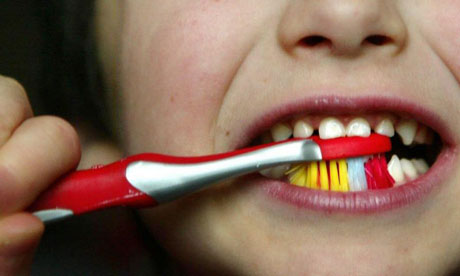
I have a friend who brushes her teeth only once a day but for 15 minutes. And another who bans her children from eating dried fruit. It seems that no one knows quite what they're meant to be doing. Should you floss, use a tongue scraper – and what exactly is the modified Bass technique? Confused? Here's your step-by-step guide.
How often should you brush your teeth, and how should you do it?
At least twice a day, says Dr Ogo Eze, who runs a dental practice in London. Does that mean you should do more? "I'd encourage people to brush after lunch as well. If you brush at eight in the morning and go to bed at 10 or 11 at night, you've got 14 or 15 hours of eating, for bacteria to build up."
But too much brushing, with bad technique, can cause other problems. "People think if they brush hard and thoroughly they are doing a good job, but you can wear away your gums and tooth surface. People think receding gums are a sign of gum disease, but it's often a sign of too much scrubbing."
The right way, says Eze, is known as the modified Bass technique. "The idea is that it's OK to brush in circles and up and down, but when it comes to the gum line, you should tip the toothbrush at a 45-degree angle, and apply gentle pressure so it blanches just under the gums, then vibrate there and flick away. Your brush shouldn't travel across the gums. It's important to get just underneath the gum because a lot of food and bacteria get trapped there."
You should always brush your tongue, or buy a tongue scraper. "Bacteria and plaque stick to the tongue, so do it whenever you brush." It should take two to three minutes to do a thorough job.
Don't brush for half an hour after eating, to give your saliva time to do its job and neutralise the acid caused by eating and drinking. Before this, your teeth are at their weakest and brushing can damage the enamel.
Manual or electric toothbrush?
"I would advise some people to use an electric toothbrush – such as those who have problems with manual dexterity. I wouldn't say electric toothbrushes are automatically better." The important thing is to learn the correct technique. I always recommend that my patients use a soft-to-medium toothbrush – hard toothbrushes cause more damage." Try one with a small head, to get to the back teeth easily.
Do I really have to floss?
Yes. But once a day is fine, says Eze. "If you are susceptible to getting food trapped, you could carry floss with you and do it during the day. Otherwise I recommend flossing at night. Different practitioners might suggest a different order, but I do it before brushing because flossing opens up your teeth slightly. When you brush afterwards, the fluoride in the toothpaste can seep into that tiny gap between each tooth." Floss between every tooth, using clean floss for each one, and go up as far as it will go without ripping your gums. "Gently saw the floss up underneath the gums and gently saw it out again. This cleans the tooth and root surface, and removes bacteria and food debris." Children with milk teeth probably don't need to floss, says Eze.
Should you use mouthwash?
A standard mouthwash can wash away the toothpaste's beneficial ingredients. "Eating sugar attracts bacteria that deposit acid, and this creates plaque, which erodes the tooth surface. The ingredients in fluoride toothpaste help to reinforce the surface." Eze thinks mouthwash is only really needed in particular circumstances. "If you have gum disease, your dentist may prescribe certain mouthwashes."
So, should you rinse your mouth out with water when you have finished brushing or leave some toothpaste in your mouth? "For children, I would say wash out, because if they still have adult teeth that have yet to come through, they may end up with too much fluoride in their body, which can damage their teeth. For adults, it's good to leave a film, but in moderation – you don't want a mouthful of toothpaste. I have a semi-rinse: I put a tiny bit of water in my mouth to brush away the toothpaste on my tongue."
What about snacking?
Don't graze on food all the time, says Eze. "I see people who eat fruit all day, but the downside is that the amount of sugar they are taking is bad for their teeth. Eat it in moderation." Avoid dry fruit as it sticks in your teeth. With all sugary foods, it's better to eat them in one go rather than throughout the day, says Eze. "If you have something sweet, within about half an hour or 40 minutes your saliva will be working hard to neutralise the acidity. If you eat sugary food throughout the day, it is constantly attacking the teeth. A lot of people have one teaspoon of sugar in tea or coffee all day without realising it causes the same problems."
Dr Ogo Eze practises at dentistw2.co.uk

